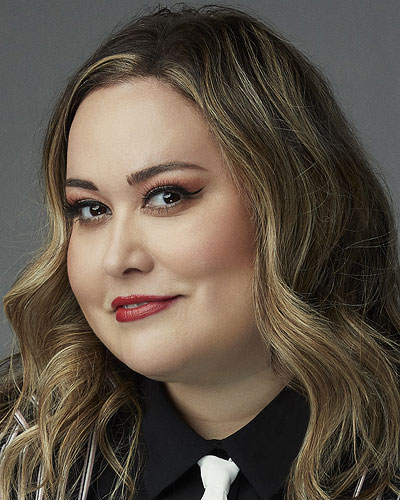
‘Unseen Latinas’ Sets Sights on Hollywood
Showrunner Tanya Saracho and writer Judalina Neira present powerful testimony to the California State Legislature as they examine systemic barriers Latinas face in Hollywood.
(5/7/2021)
Latina writers are woefully underrepresented in Hollywood. According to UCLA’s Hollywood Diversity Report 2021, among the top 185 English-language films released in 2020, about 3% of credited writers were Latinx. Among those writers, none were Latinas. And though the WGAW Inclusion Report 2020 does not report on Latinas specifically, it found that only 4.7% of employed screenwriters were Latinx in 2019, and only 8.7% of employed TV writers were Latinx in the 2019–2020 season. This is far from reflecting the 18.3% of the total U.S. population that Latinx people represent.

Tanya Saracho
The issue of Latina underrepresentation in the industry was the topic of the April 23 informational hearing held at the California State Legislature as part of its Unseen Latinas Initiative, led by Assemblywoman Lorena Gonzalez (D-San Diego), Assemblywoman Wendy Carrillo (D-Los Angeles), and State Senator María Elena Durazo (D-Los Angeles). Testifying at the hearing, WGAW members Tanya Saracho (Vida) and Judalina Neira (The Flash, untitled The Boys spinoff) spoke passionately to lawmakers about their lived experiences and concrete steps the industry must take to increase the number of authentic stories being told about Latinas in the U.S.
Saracho shared her journey of becoming one of the few Latina showrunners in a position to hire other Latinas, as showrunner and creator of Vida, made for Starz. Saracho entered her first writers’ room as a “diversity hire,” explaining that “when I found out what ‘diversity hire’ meant, it meant I didn’t cost the studio a thing. What I heard is, ‘you have no value.’” From that beginning, Saracho committed to championing Latinas and, with Vida, hired an all-Latinx writing staff, directors, and editors by the third season. Saracho credited the Latina executive at Starz who greenlit her show as absolutely critical to her success, noting that “we don’t have a lot of people inside the castle, we don’t have a lot of people championing us.”

Judalina Neira
Researcher and co-author of the UCLA Hollywood Diversity Reports, Dr. Ana-Christina Ramón, underscored the lack of representation at the executive level in her statement to the legislators.
“There is almost no Latinx representation, regardless of gender, within the executive suites in Hollywood,” Ramón explained. “Among film executives at the 11 major and mid-major studios, there is no Latinx representation at all. Among TV executives at the 74 studios and networks that we examined, there are no Latinx CEOs and only two Latinx executives among senior management, which counts for less than 1% of the total positions at that level. One is a Latino CFO and the other is a Latina President of Content and Chief Creative Officer for 7 TV networks within the larger corporation. Among unit heads, there are less than 2% Latinx executives overall. Among those 11 executives, there are only 5 Latinas that are at the unit head level.”
As a former writing fellow of the National Hispanic Media Coalition and graduate of NBC’s Writers on the Verge program, Neira spoke about the recent success and prevalence of pipeline programs. But she stressed that while more Latinas are getting their first break, many Latinas and underrepresented writers face barriers to advancing up the ranks.
Neira and Saracho offered systemic solutions: studios should increase the number of Latina showrunners and executives who make the hiring decisions; Latinas need help advancing up the levels in a room so they don’t get stuck as a “diversity hire” or staff writer; and studios need to make affirmative commitments to offering more Latinas overall deals or first look deals to get access to Latinas’ original ideas. As Neira said, “The single best way to increase Latina representation in the writers’ room, on screen, and even in the crew is to put Latinas in a position where they can hire other Latinas: Put us in charge.”
In the meantime, Saracho and Neira continue to build momentum for Latinas through their own efforts. Saracho is committed to changing the industry through her own production company and incubator, and in partnership with other Latina showrunners through the Untitled Latinx Project. Neira is focused on increasing mentorship opportunities and visibility for Latina writers with La Lista, a group she co-founded, which has grown from 40 to 167 Latina writers over the past five years.
Assemblywoman Gonzalez concluded the informational hearing by applauding the panelists’ courage for testifying, noting that some invited speakers feared the consequences of telling their stories.
Watch highlights from the hearing on YouTube or watch the full recording via the California Assembly.
